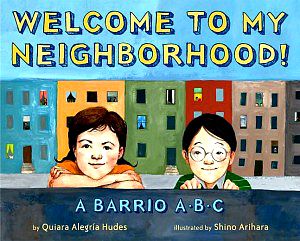
Welcome to the Horn Book's Family Reading blog, a place devoted to offering children's book recommendations and advice about the whats and whens and whos and hows of sharing books in the home. Find us on Twitter @HornBook and on Facebook at Facebook.com/TheHornBook
Welcoming everyone to the neighborhood
When I saw Welcome to My Neighborhood: A Barrio ABC at the library, I was immediately intrigued.
 When I saw Welcome to My Neighborhood: A Barrio ABC at the library, I was immediately intrigued. I am always interested in books about people of color and since my daughter is half Latina, I wanted to see what this book was about.
When I saw Welcome to My Neighborhood: A Barrio ABC at the library, I was immediately intrigued. I am always interested in books about people of color and since my daughter is half Latina, I wanted to see what this book was about.I’m all for "keeping it real," but when I read the first page and saw that A was for Abuela — and for abandoned car — I wondered if this book was keeping it too real with its depictions of neighborhood blight. But as I flipped through it, I decided that it was not too much. Abandoned cars and other signs of neglect are a very real part of some kids’ lives. There is beauty everywhere in life and the narrator finds it in broken bottles “that are smashed like falling stars” and a vacant lot that has become a vegetable plot.
My husband, who is Puerto Rican, read the book to our daughter and when they got to the letter R, the book mentions Rincón, a town in Puerto Rico where he has family.
It is so very important to see yourself reflected in all types of media. And a book like this will probably be very affirming for kids who have similar experiences, but what about the kids that don’t immediately identify with the kind of neighborhood portrayed in the book?
The jacket copy suggests that after reading about this neighborhood, young readers can think about what is special about their neighborhoods. They can also reflect on memories that make their lives special because that is an important part of the book.
For example, if a student says the book doesn’t reflect his or her life, ask questions such as:
- If your Abuela doesn’t make ham and cheese or teach you to play dominoes, what special things do you share with your grandmother?
- People don’t play basketball where you live, okay, what do they play?
- The mother wants the children to remember certain things, specifically about their heritage and the narrator admits to forgetting Spanish words. What are adult always telling you to remember?
RELATED
RECOMMENDED
ALREADY A SUBSCRIBER? LOG IN
We are currently offering this content for free. Sign up now to activate your personal profile, where you can save articles for future viewing.






Add Comment :-
Comment Policy:
Comment should not be empty !!!
Kathy Snow
I'm not sure most kids would even ask some of the questions you mention. I've never had children say "This town doesn't look like mine" or "These people don't look like me." I suspect some adults superimpose their own questions and concerns onto books and their audiences. I agree with Jada Bradley about seeing yourself reflected in a book, but I think it's the character traits and ideas that resonate with me more than the physical appearances. As for me, I love to read about other places and people. It's the next best thing to going there. Of course, I'm writing this to the background noise of Pete's Pond, in Mashutu Reserve in Botswana.Posted : Oct 15, 2015 06:29